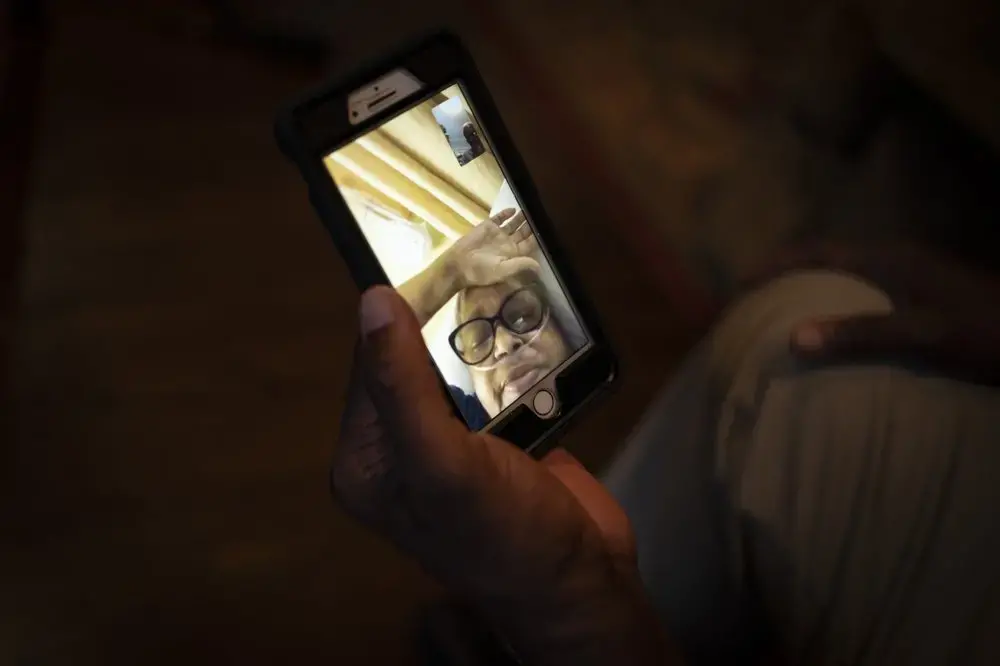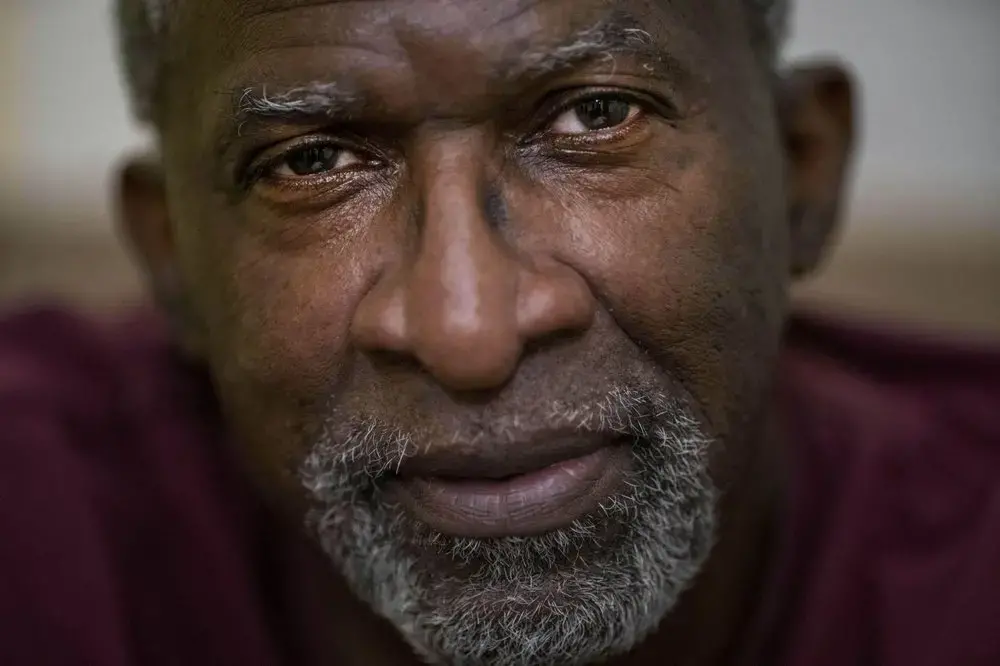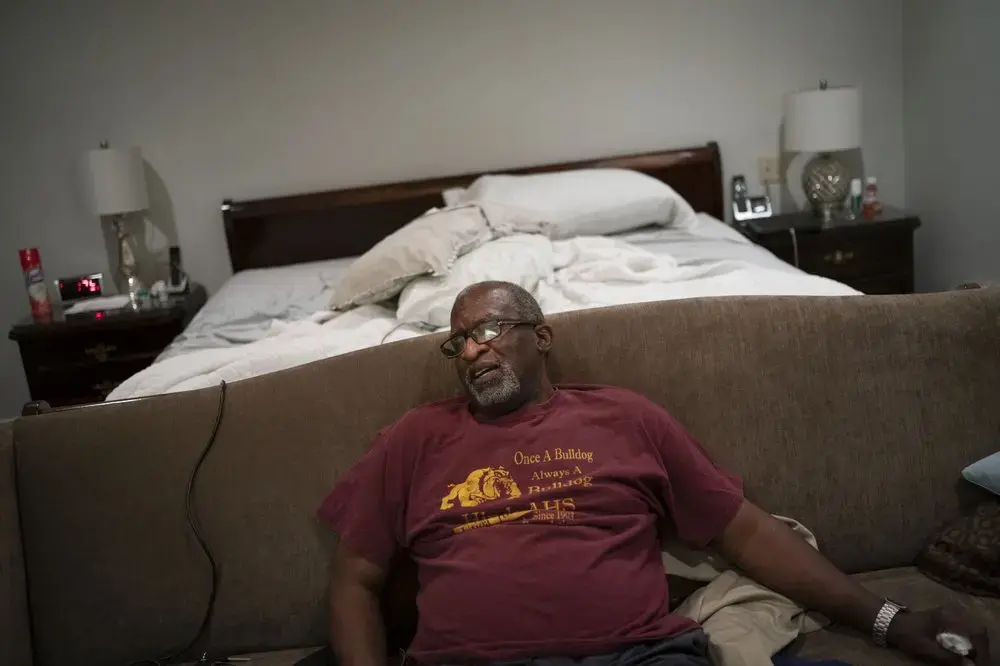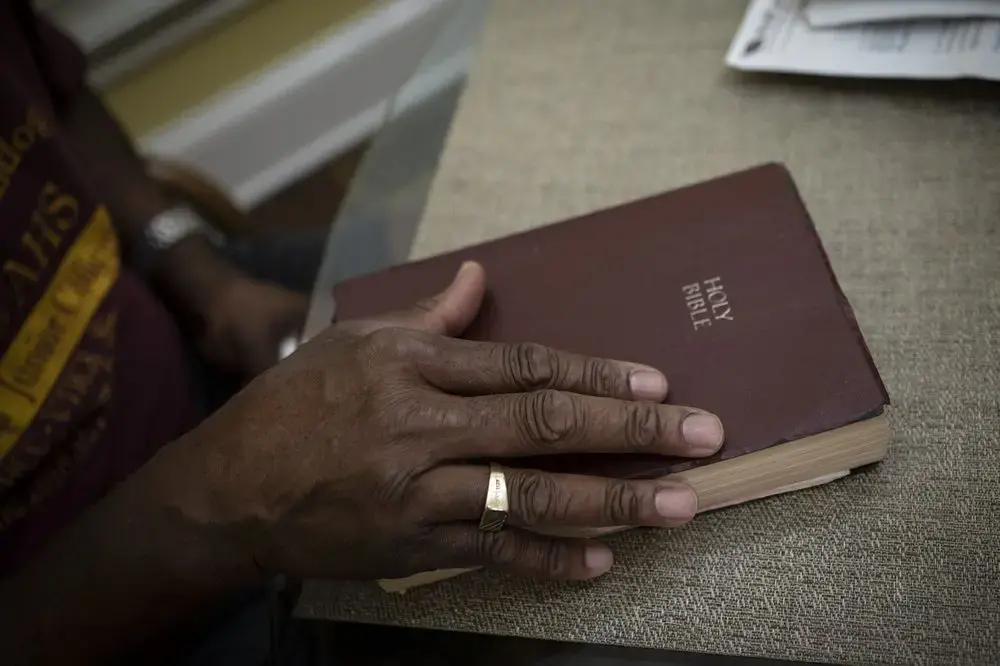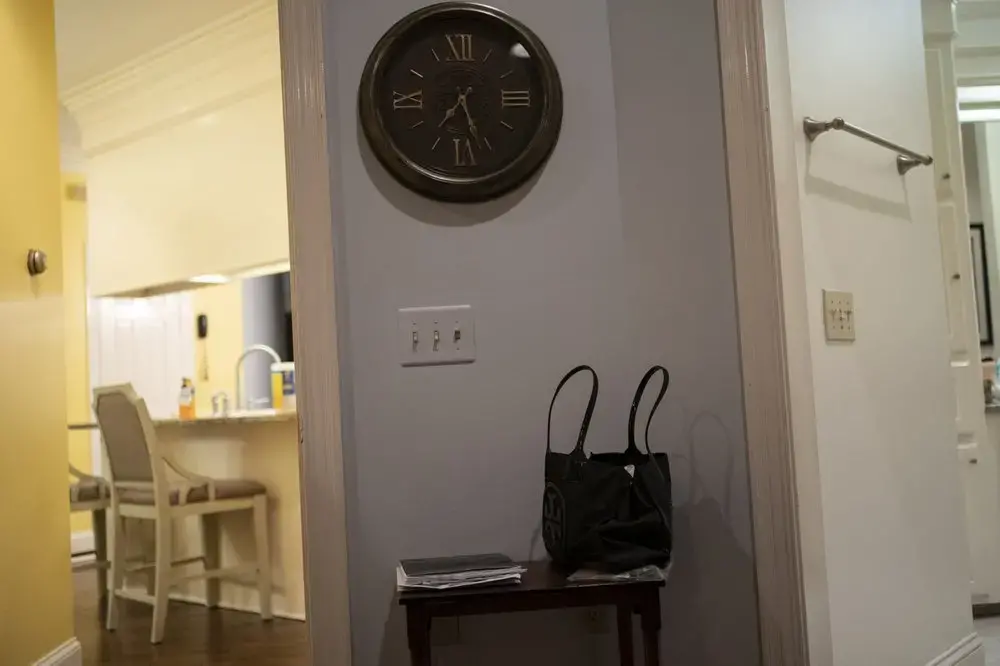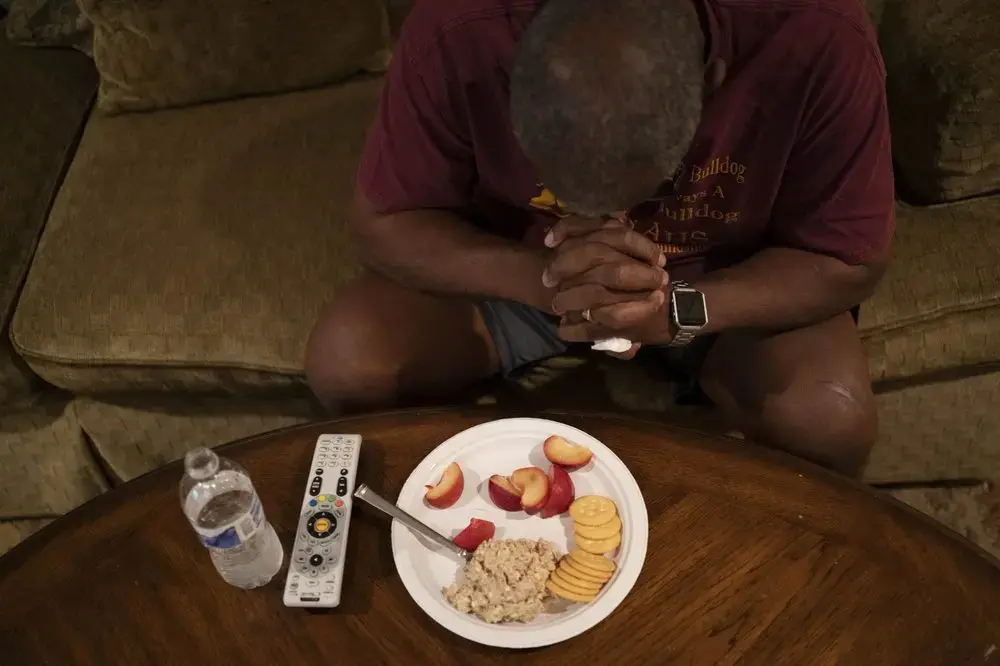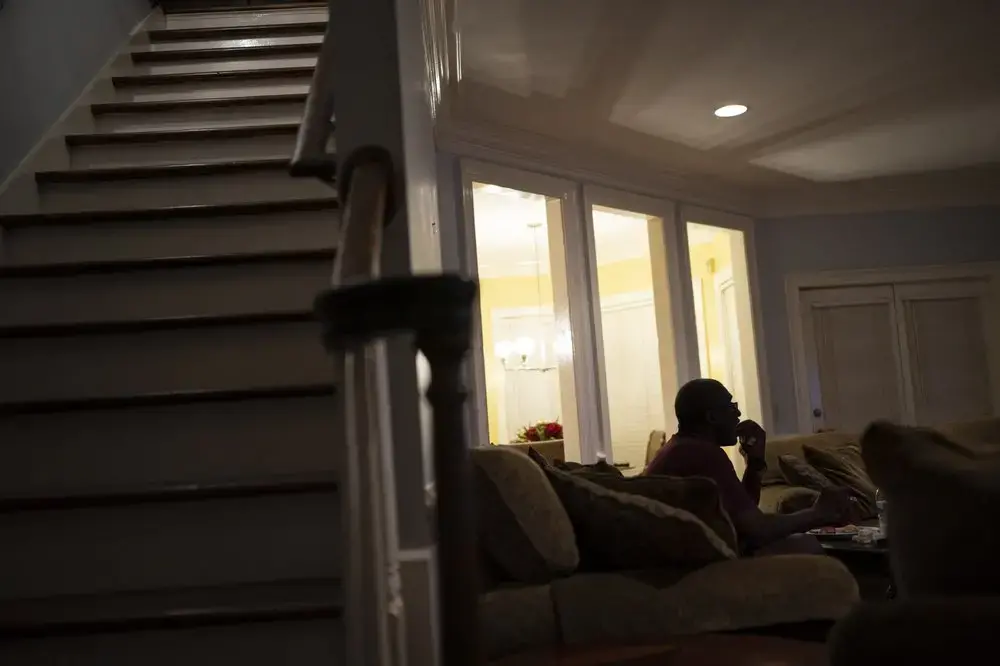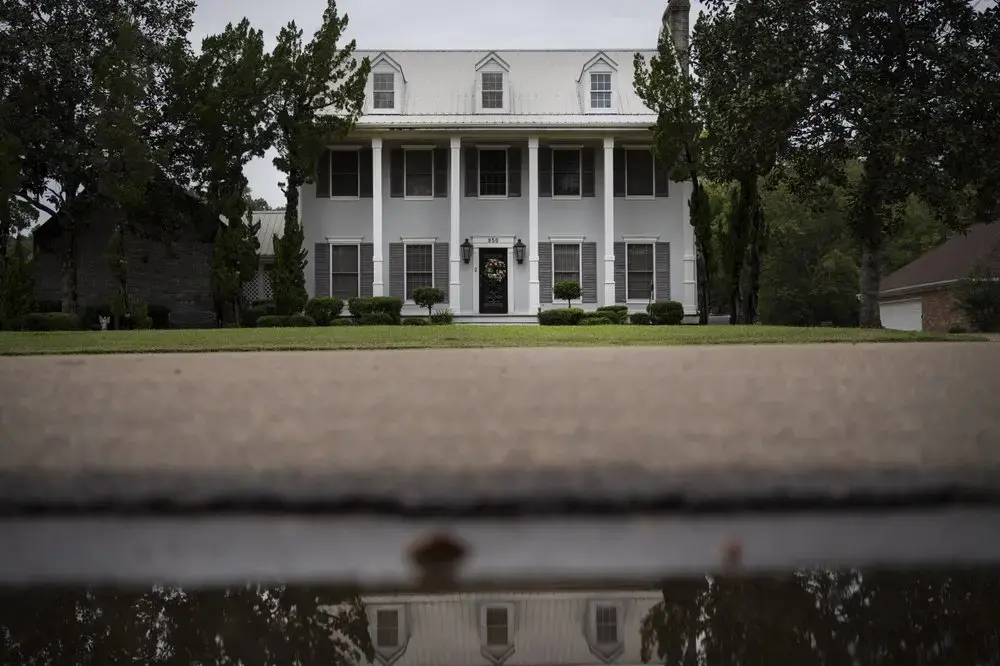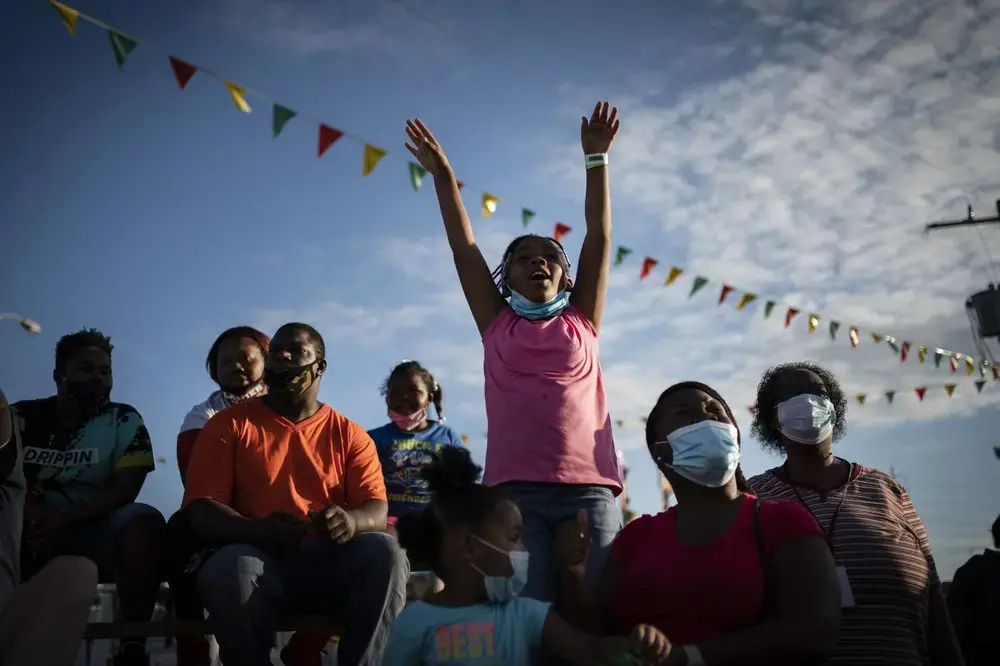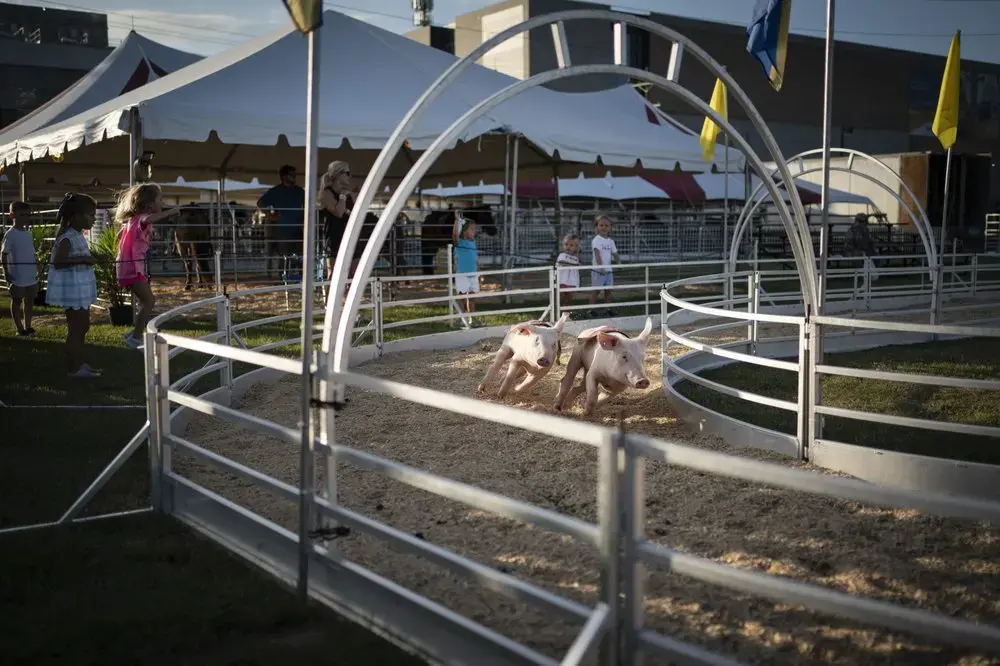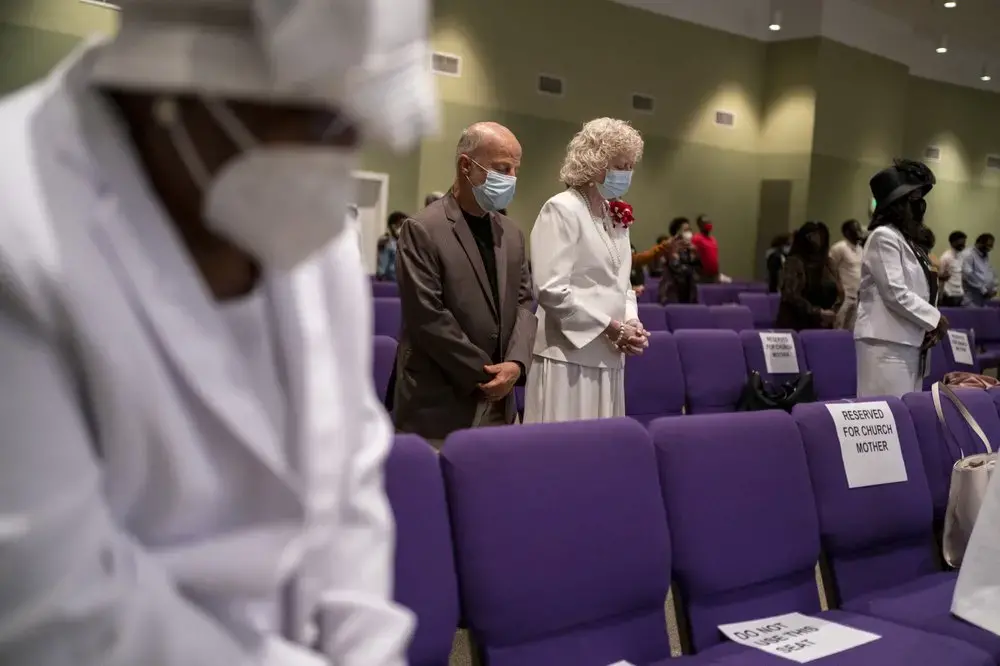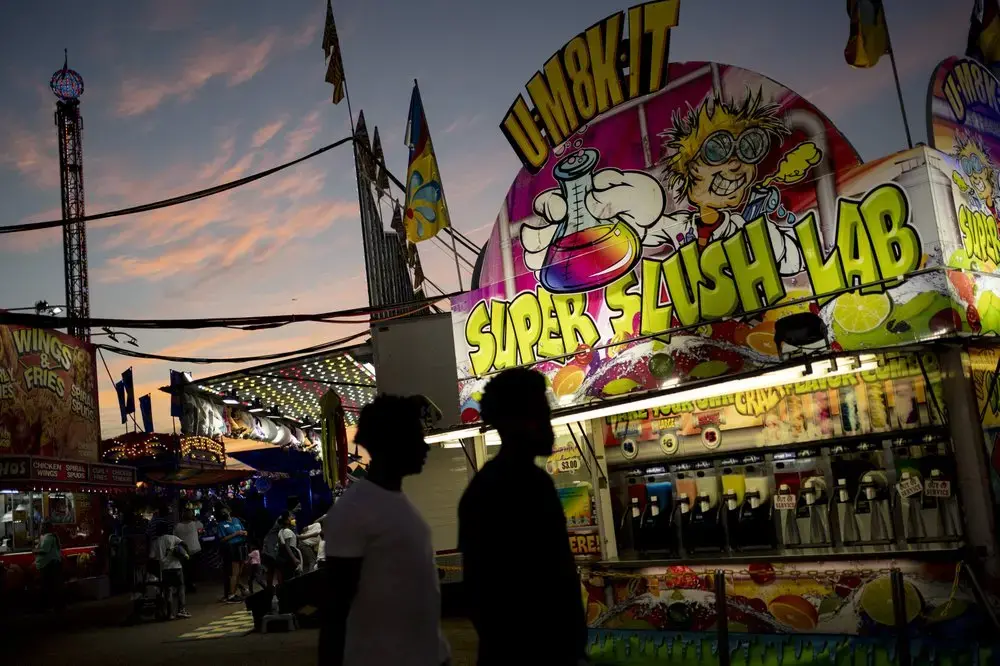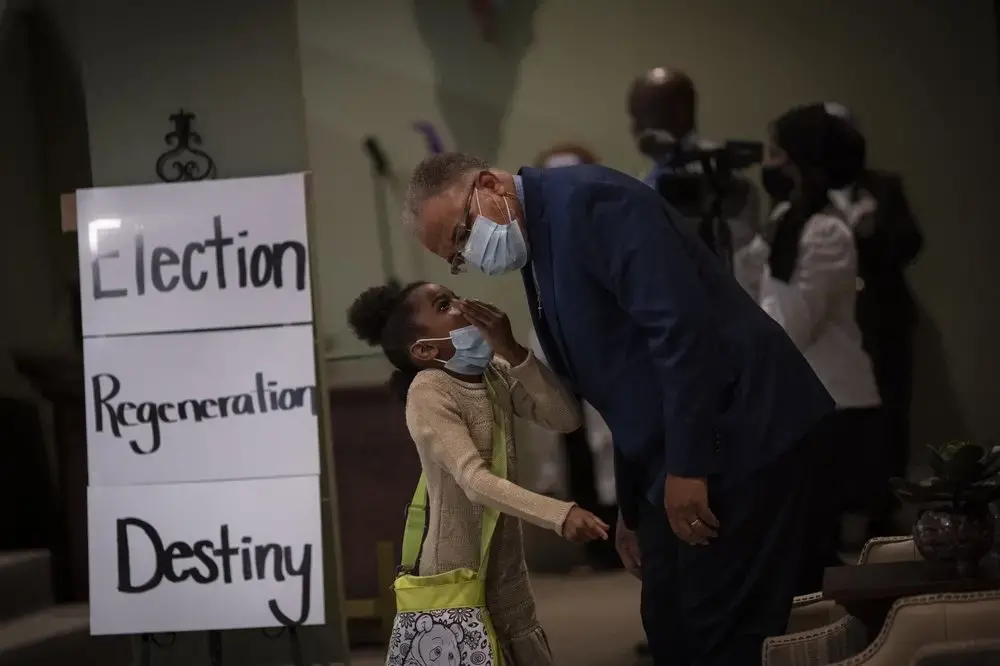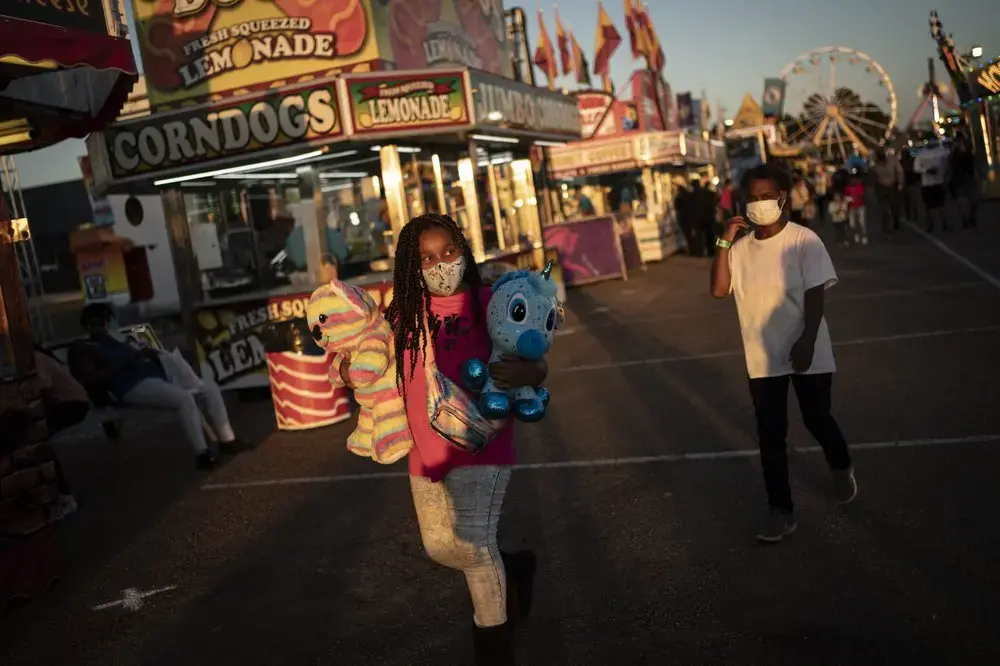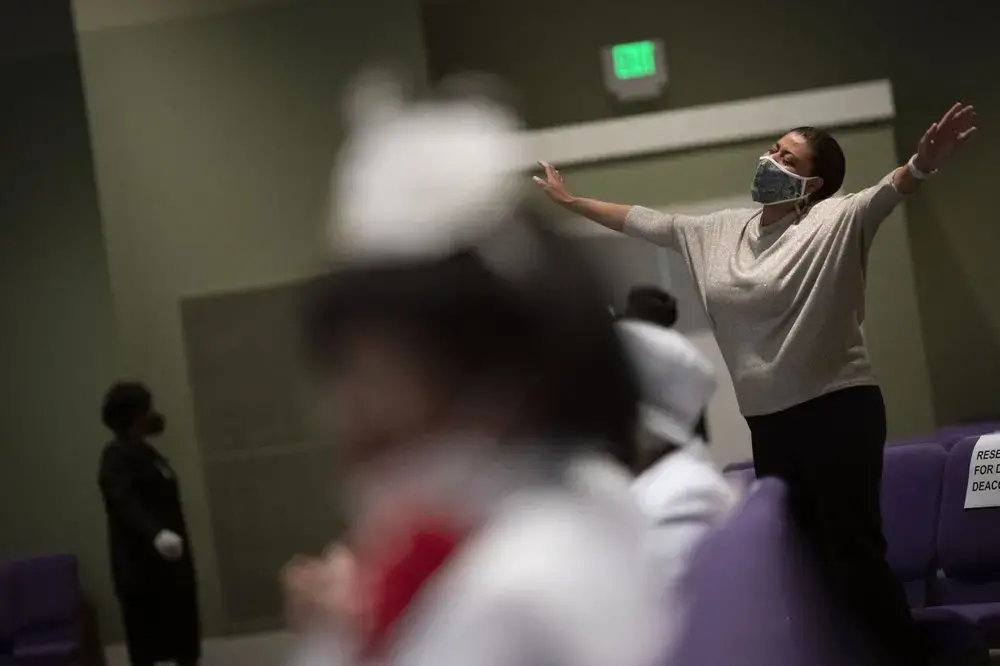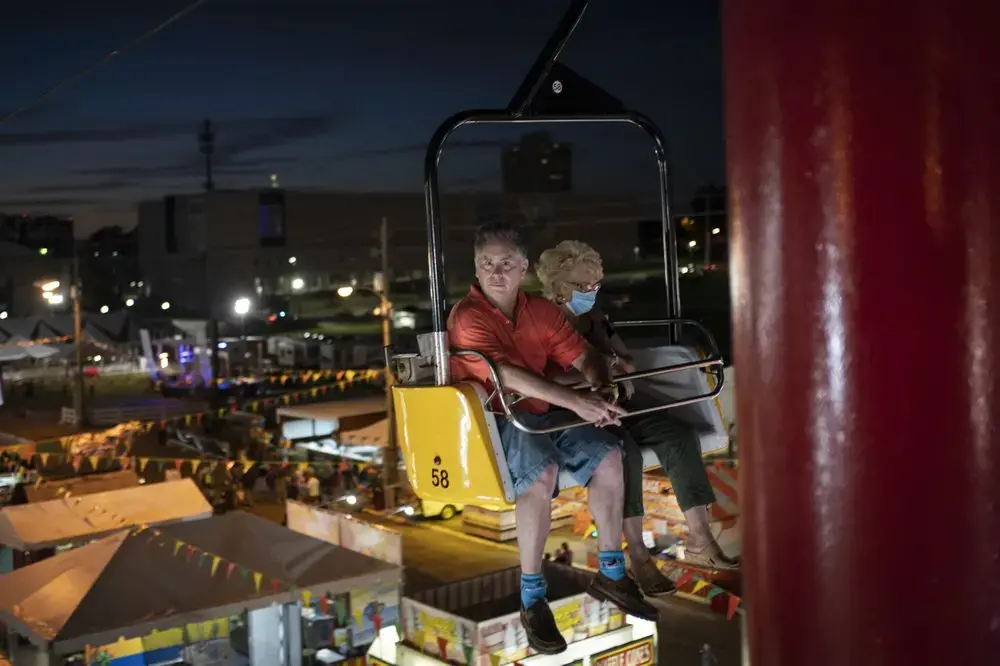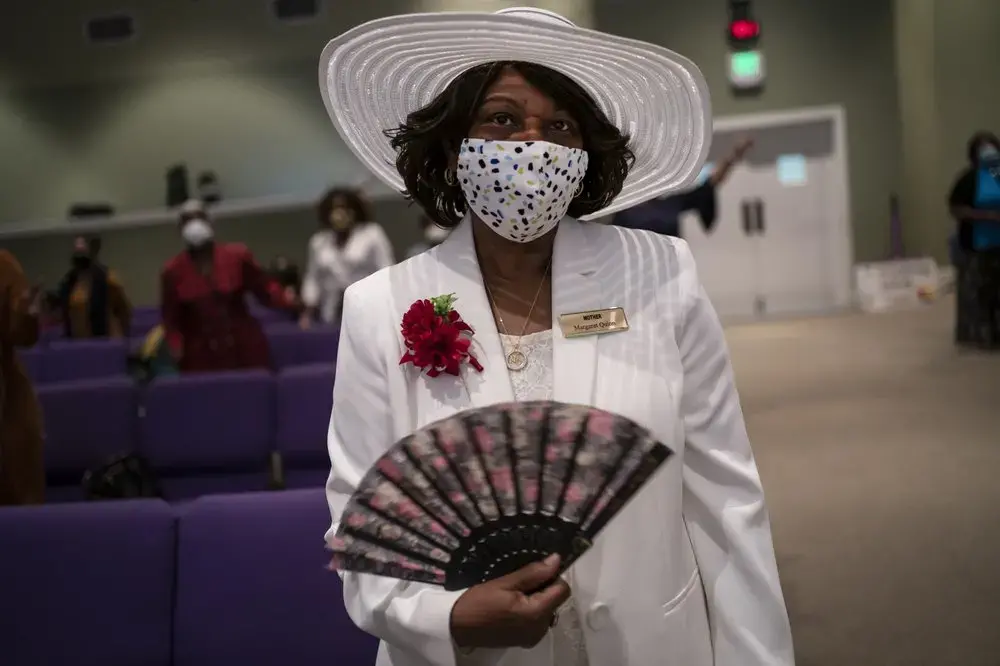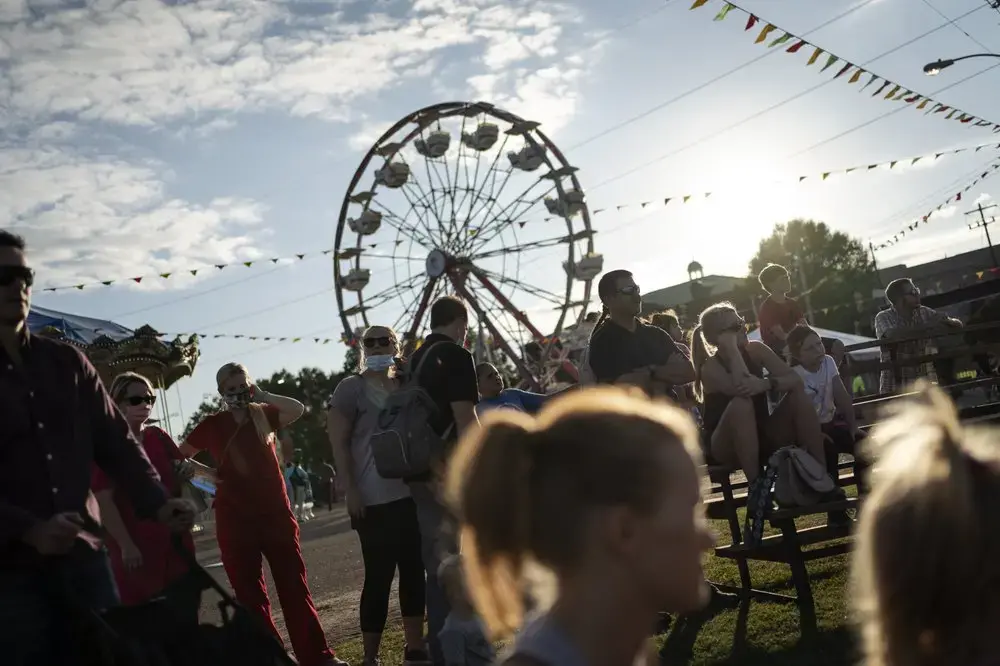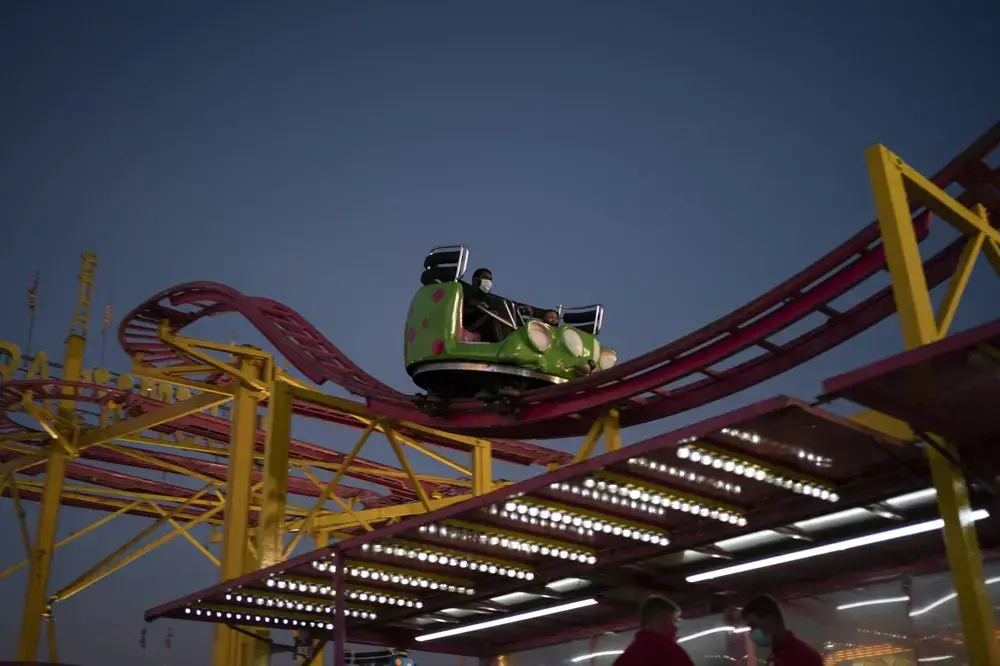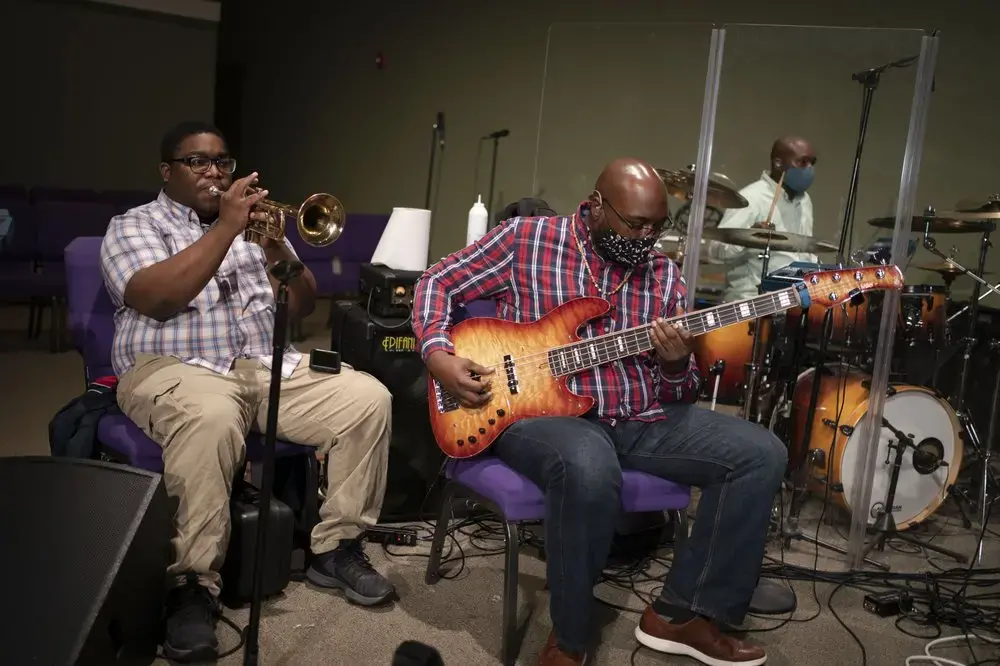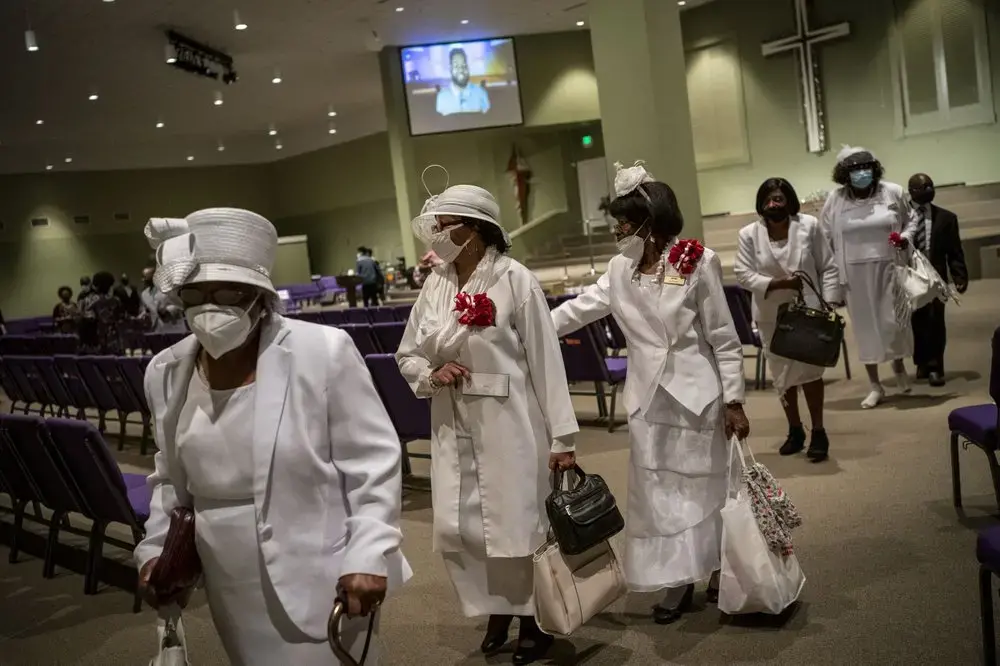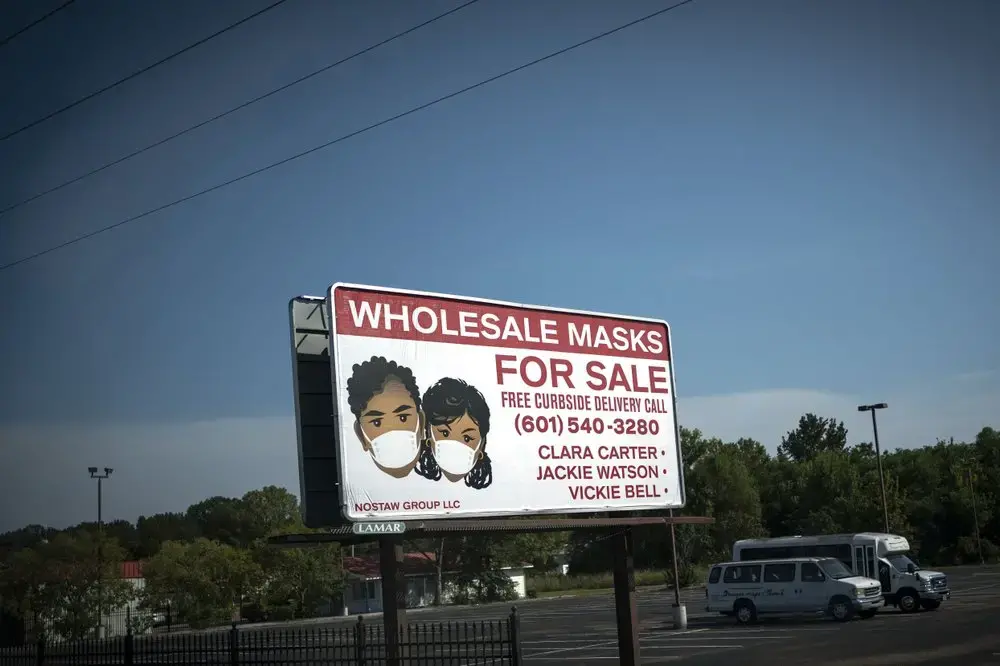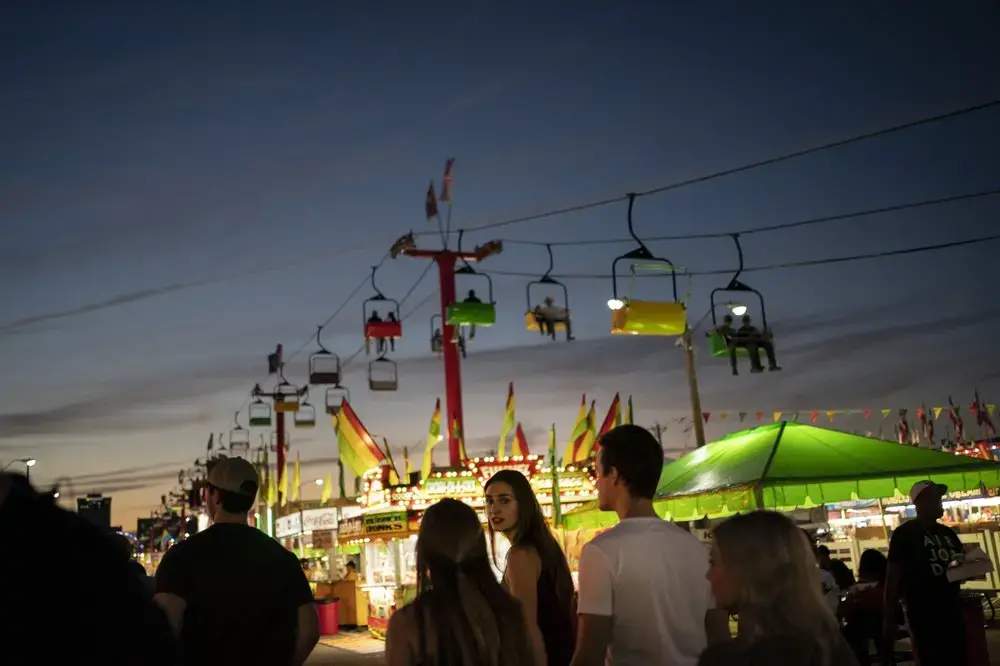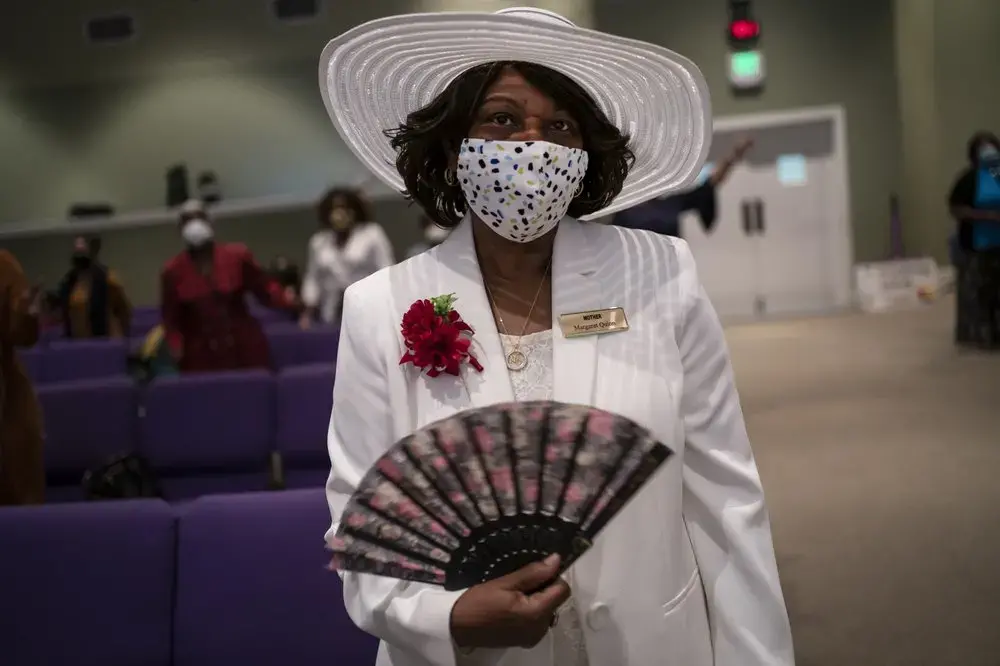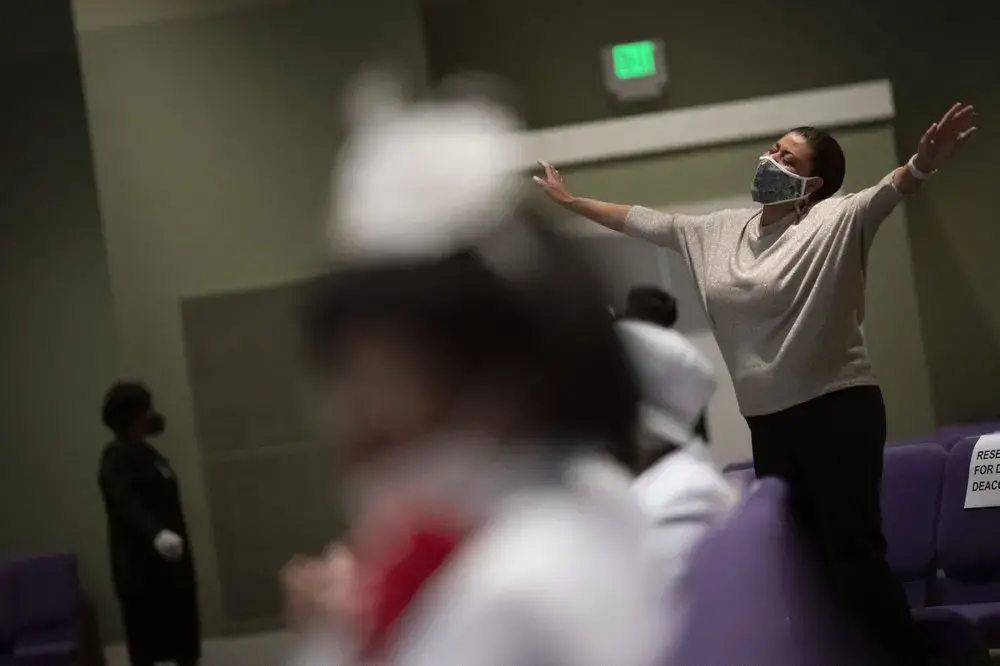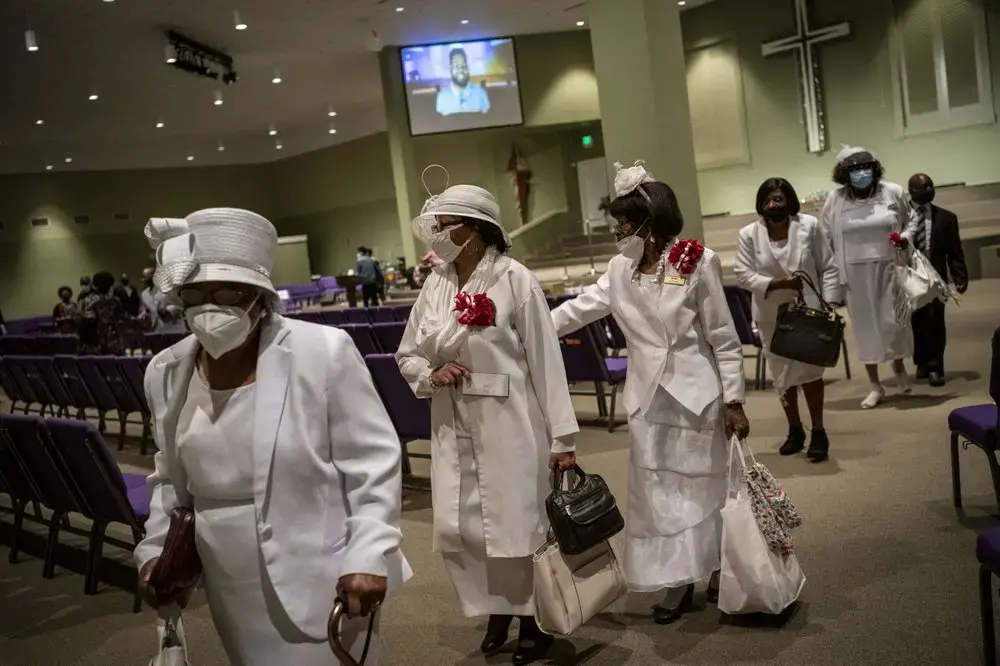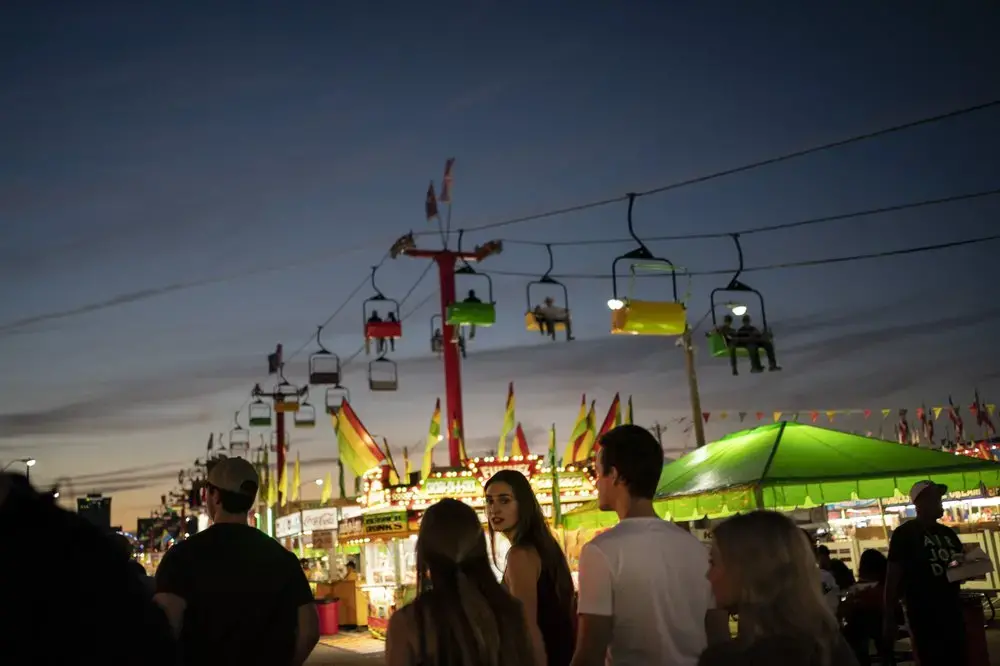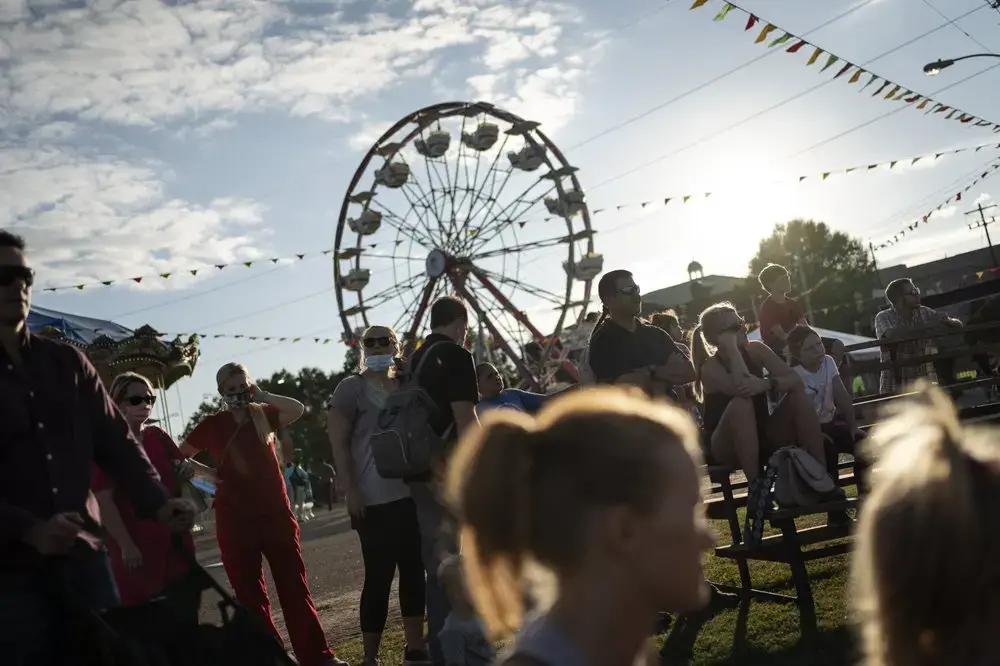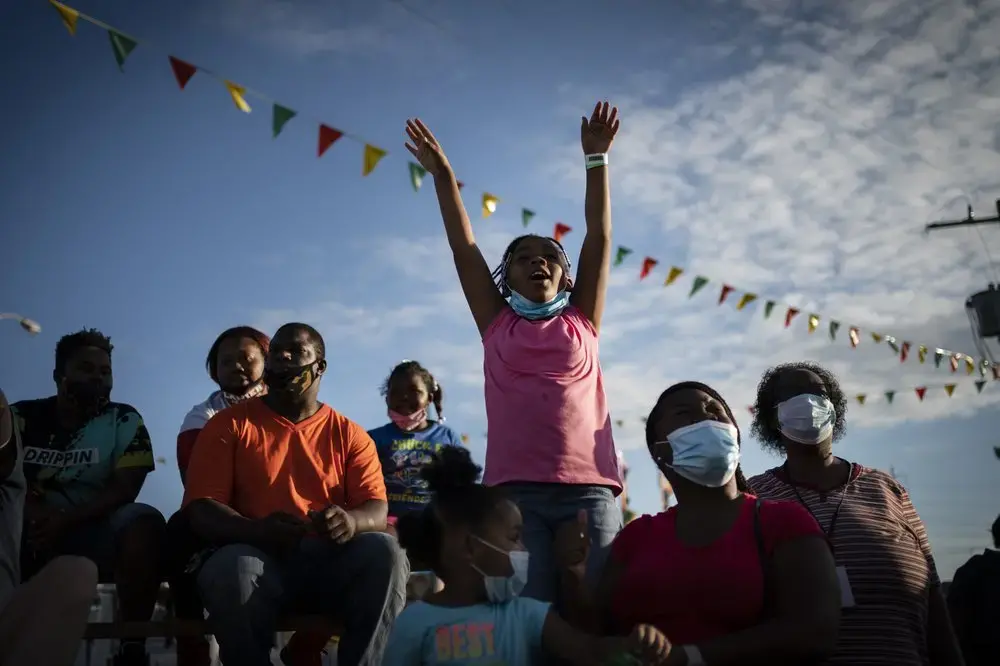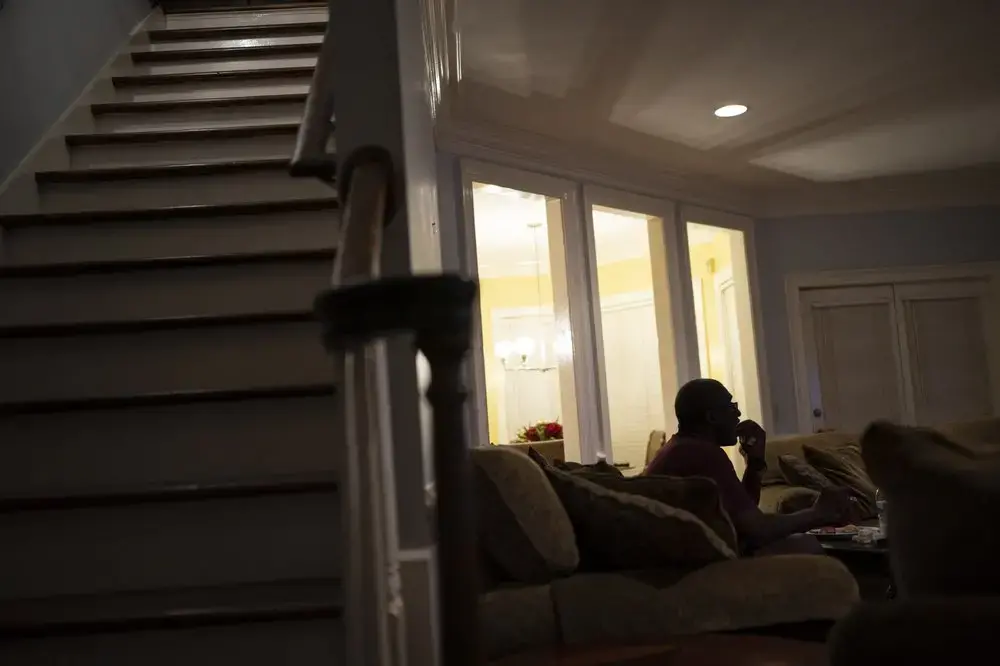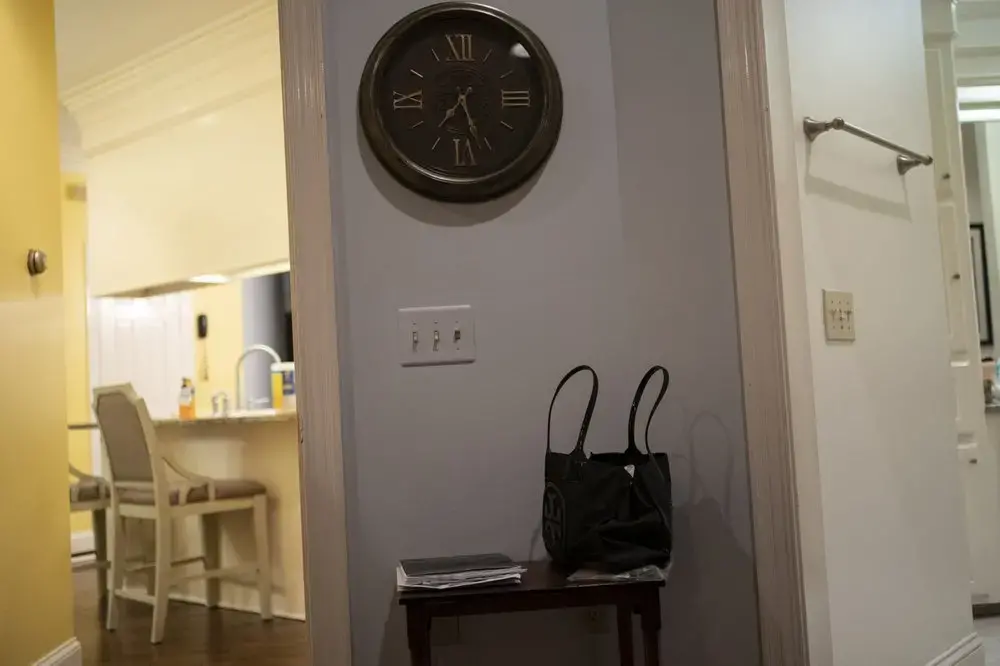JACKSON, Miss. (AP) — Her voice cracked as she spoke from her hospital bed. “I want to go home,” she pleaded.
More than 40 miles away, her husband sat in their living room, looking intently into his phone as they spoke on a video call, trying to soothe her. Bonnie Bishop had been in the hospital since early July. She’d been on a ventilator. She’d had surgery to put a tube down her throat. She’d been in a coma for six weeks. Sometimes, it was just too much, and on this October evening, she started to weep silently.
“You are coming home,” Mike Bishop, 63, said firmly. He seemed to be speaking as much to himself as to his wife. “You know you are.”
Watch their interaction. (AP Video/Noreen Nasir)
____
This is a love story.
It’s a story about coronavirus, the people it strikes down, and a big quiet house outside of Jackson, Mississippi. It’s about those who take COVID-19 seriously, those who don’t, and how that divide breaks uncomfortably along racial lines.
Mostly it’s about Bonnie and Mike Bishop, an African American couple who met more than 25 years ago when she was organizing a basketball game to support an adopt-a-school program run by AT&T. She worked there until retiring a couple years ago. He still works there as a digital technician.
I met Mike on an Associated Press road trip across America that three of us are taking to try to make sense of a year like no other, with a global illness, protests over race and virulent politics. We went to talk to a pastor in Jackson about election issues. He told us about Mike and Bonnie.
Mike is tall and handsome, with a beard going grey and a gentle voice that’s almost musical. He radiates decency. It’s impossible not to like him.
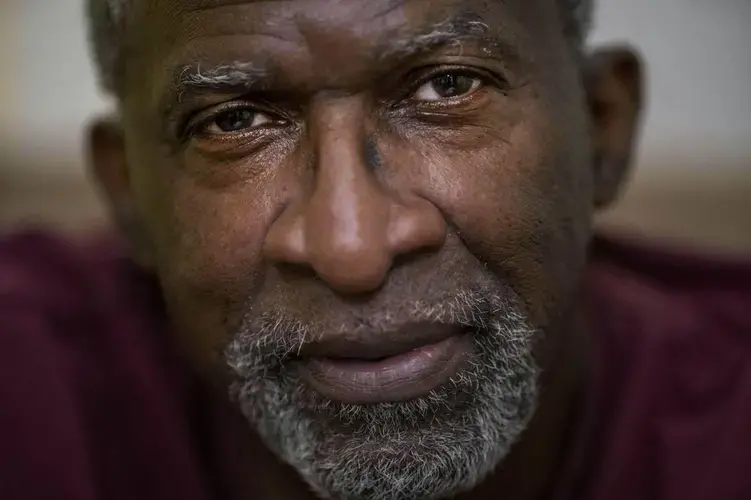
For him, Bonnie is everything. She’s the woman in oversized sunglasses who hates to have her picture taken. She loves to read and can sometimes be quiet, Mike says, but once she knows you she’s a talker. In photos, it’s obvious from how she looks at him that she adores Mike.
In early July, Mike began to feel run down. It was just a minor dry cough, but he took a coronavirus test and it came back positive.
Soon, Bonnie also tested positive.
A couple days later, she woke him up at 3 a.m. “I cannot breathe,” she gasped. “911.”
Mike, whose own case of COVID-19 meant he couldn’t go with her to the hospital, helped strap her onto a stretcher. He held her hand as they walked out to the ambulance.
Then, with lights flashing, the ambulance took her away up Woodlee Drive. He watched it disappear into the night.
“I was empty. Scared. Terrified,” he said. “And I was praying.”
__________
Bonnie was management when they met. Mike is fiercely union. He’s also friendly and outgoing and likes to do the right thing. Plus he has the gargantuan hands of a man who was palming basketballs when he was barely a teenager. So he agreed when she asked if he’d join the AT&T team.
At the game, a friend of Mike’s nodded toward Bonnie: “Man, she’s checking you out,” he said.
“She hates it when I tell this story,” Mike said.
A week or so later, there was an office party at her house for the people who played in the basketball game. The jury is still out on whether that was a setup to see him again.
“We have been together ever since,” he said. “The Sunday (after the party) she invited me over for lunch. I went over for lunch. Monday, on the way to work, I had coffee. That weekend we did something. About a month later I moved in. And about 8, 10 months later we were married.”
They’d both been married and divorced. Neither had kids. But their relationship stuck. Hard.
They’ve been married now for a quarter-century.
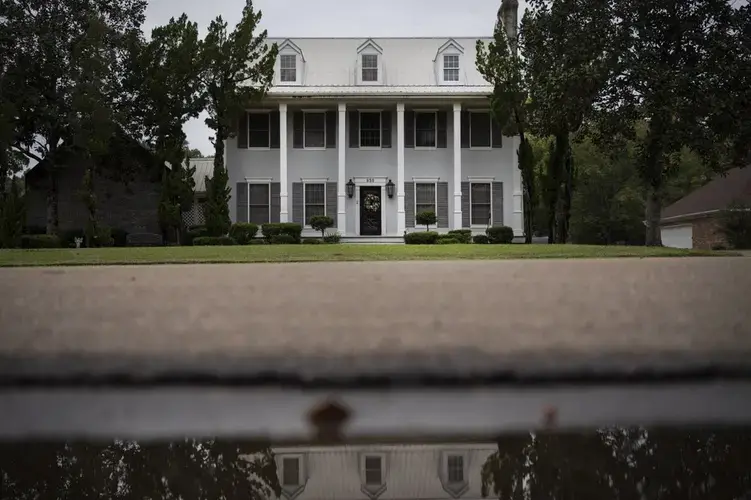
They bought a house together, which she has decorated with oversized furniture and leopard print cushions. They went to the Caribbean; they went to New Orleans. They spend time with his mother, who still lives on the small farm west of here where he grew up. Her ailing mother moved in with them for a couple years until she died. There are friends and relatives and a deep wellspring of Christian faith that runs through their lives.
And now?
“I am so empty and lost without her being here,” he said. “It is the worst I’ve ever felt. The most alone I’ve felt in all my life.”
But in his own gentle, self-controlled way, he’s also angry.
“Red-blooded American people say they’re patriotic but don’t care nothing about their fellow man because they don’t want to wear a mask!” he said.
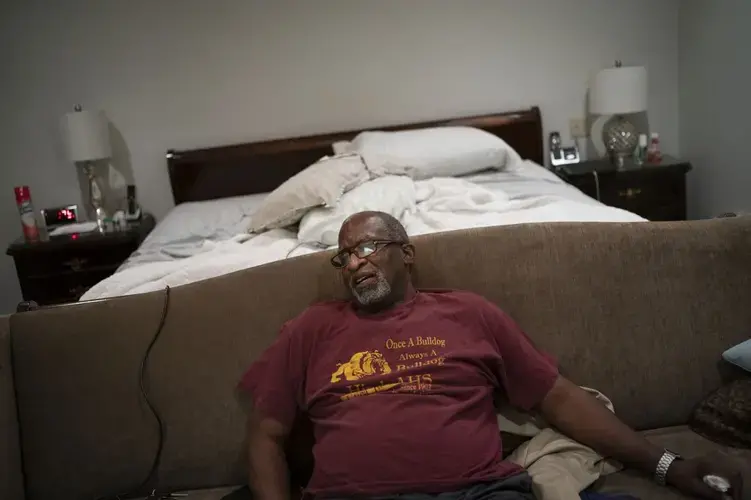
Mike is shocked at how lightly many politicians take the disease, and the way mask-wearing has become politicized.
“When I see people say that it’s a hoax? This is real! I took every protection in the world. I washed my hands so much I joked to the guys at work: ‘Pretty soon I’m going to be as white as y’all.’”
He stumbled for the right words: “I go to a bad place if I allow myself to.”
Across the country, racial minorities, especially Black people, have been hit hard by COVID-19. They are more likely to live in crowded housing and work essential jobs, whether in grocery stores or hospitals, and have a long history of second-rate health care. African Americans have also long struggled with chronic health problems that can cause more deaths from COVID-19.
The virus ripped through Mississippi’s Black community early in the pandemic. About 60% of infections and deaths were among African Americans, who make up 38% of the state’s population.
Go to a Black church service now and there are often carefully enforced mask mandates, multiple disinfectant stations, parishioners sitting far apart, and pastors who don’t let anyone forget the disease is serious.
“If folks didn’t know it, now they know it’s not a hoax,” Bishop Ronnie Crudup said during a service on the Sunday after President Donald Trump tested positive for the virus, speaking from the pulpit of New Horizon Church International in Jackson.
“I don’t agree with Donald Trump,” he said. “But that doesn’t mean we can’t pray for his life.”
By late October, with a surge in U.S. cases also hitting Mississippi, white people finally outnumbered Black Mississippians in both cases and deaths. Yet masks remain a rarity in many white neighborhoods.
At the annual Mississippi State Fair, the contrast is jarring. Amid the carnival rides, pig races and stalls selling gator-on-a-stick, the vast majority of Black people were wearing masks on an October evening. Most white people were not, even as their infection rates increased.
“Big parts of the white community, especially in areas that weren’t as hard affected, have not been as compliant or engaged actively with social distancing and masking,” Dr. Thomas Dobbs, the Mississippi state health officer, told reporters a couple weeks ago.
Mike pauses repeatedly as he talks about how race plays into the response to the virus.
“I think that if it had hit the white community like it hit the African American community, it’d be a whole different ballgame,” he said.
He seems surprised to find himself seeing the virus through the lens of race, which he doesn’t normally dwell on much. But the killings of Black people by police and the nationwide protests for racial justice, along with increasingly racist murmurs on social media, have unsettled him.
“I thought that a lot of that stuff that we were supposed to be beyond, we are truly not,” he said.
Still, he’s a relentless optimist: “It’ll get better — it HAS gotten better.”
For months, he had to fight to be optimistic about Bonnie, who is in her late 60s.
“Had it not been for family, friends and faith I just don’t think I would have made it,” he said. “You lose your will to do stuff. It’s almost like it’s a daily struggle: ‘Why am I doing this?’”

___
When Bonnie arrived at the hospital doctors quickly put her on a ventilator. Then into a medically induced coma.
For weeks, Mike called the hospital continually: 6 a.m.; mid-morning for the hospital shift change, early afternoon; mid-afternoon; dinnertime; just before he went to bed.
Nurses insisted they’d call him if there was news, but he told them that wasn’t enough: “‘I know I might be a pest, but I can’t talk to her. She can’t talk to me. Y’all guys are my eyes and ears,’” he said.
After about six weeks, doctors took Bonnie out of the coma. She awoke disoriented and scared, with a breathing tube down her throat that made her feel as if she was choking. They quickly sedated her again. To make her more comfortable, they cut a hole in her windpipe for the breathing tube.
Back home, Mike had returned to work, after taking a month off to recover from COVID-19 and follow Bonnie’s progress. He was living alone, in their big suburban house with pillars out front, a perfectly kept lawn, well-trimmed hedges and magnolia and juniper trees.
He’d wake up confused at 2 a.m. when she wasn’t beside him. He was alone when he left for work. No one was home when he came back.
“All this was for her!” he said, gesturing around at the house. “This was hers, and it’s empty without her.”
In normal times he loves to cook, but these days meals are a chore. Dinners are often leftovers and frozen vegetables that he eats in front of the television, watching the news or a football game. Ten minutes later he’s finished and washing the dishes at the kitchen sink.
He avoids things that remind him too much of Bonnie. Her purse sits untouched in their bedroom, along with her iPad. He won’t sleep on her side of the bed.
At night, he sleeps with the TV on.
“If I don’t have the TV on I hear the clock all night. I hear the ‘tick-tock, tick-tock.’” he said. “If it rains, I can hear the rain dripping.”
He comes from a large, tightly knit family. He’d felt the pain of losing two brothers and two sisters. He couldn’t imagine losing Bonnie, even if he always believed she’d survive.
“But I also had to keep praying that whatever God’s will, I got to be able to accept it.”
“There were nights that I just prayed and prayed that she’d just make it to the next day,” he said. “Make it to the next day. Just make it to the next day.”
Medical problems continued even after she was brought out of the coma. She needed regular dialysis. Fevers would spike. She was disoriented and sleepy from all the drugs.
Mike saw her a couple times when she was in the Intensive Care Unit, though she didn’t know he was there.
At home, he still spoke to her, speaking aloud into the silence.
“I’d have these conversations just like I’m talking to you,” he said.
Very slowly she started to get better. She couldn’t feed herself for weeks because she was so weak. The breathing tube meant she could only speak with the help of a small electronic voicebox.
Day by day, though, they communicated more. FaceTime became a lifeline.
By that point he was emotionally spent. His friends could see it.
“It’s kind of hard to fake strength when you feel like you’re on the verge of a nervous breakdown,” he said.
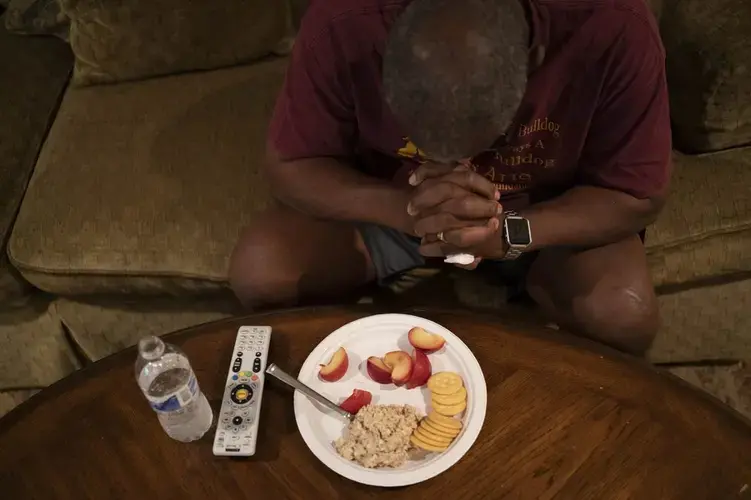
There were sparks of hope: when the fevers stopped; when she could hold a conversation; when she first spoke without the electronic voicebox.
But it was not until late September, maybe early October, that Mike’s fear began subsiding, as he and Bonnie spoke multiple times a day. After more than three months in bed, she’d be going into a rehab facility soon, to re-learn how to walk and care for herself.
In mid-October, he hoped she’d be back by late November. He was already planning the Thanksgiving meal: a small turkey, gravy, creamed corn, salad. His mother would bake a cake.
“The usual,” he said happily.
This week, he got even better news.
Bonnie’s recovery was going far faster than expected. The weeks of rehabilitation could be done at home, doctors said.
She’ll be home this weekend.
“She’s not 100 percent, but she’s close enough,” he said in a phone call.
Mike was almost giddy. He could take care of her, protect her, cook for her. Finally, her voice would fill the quiet of the big house again.
“I love that woman.”
COVID-19 Update: The connection between local and global issues–the Pulitzer Center's long standing mantra–has, sadly, never been more evident. We are uniquely positioned to serve the journalists, news media organizations, schools and universities we partner with by continuing to advance our core mission: enabling great journalism and education about underreported and systemic issues that resonate now–and continue to have relevance in times ahead. We believe that this is a moment for decisive action. Learn more about the steps we are taking.





